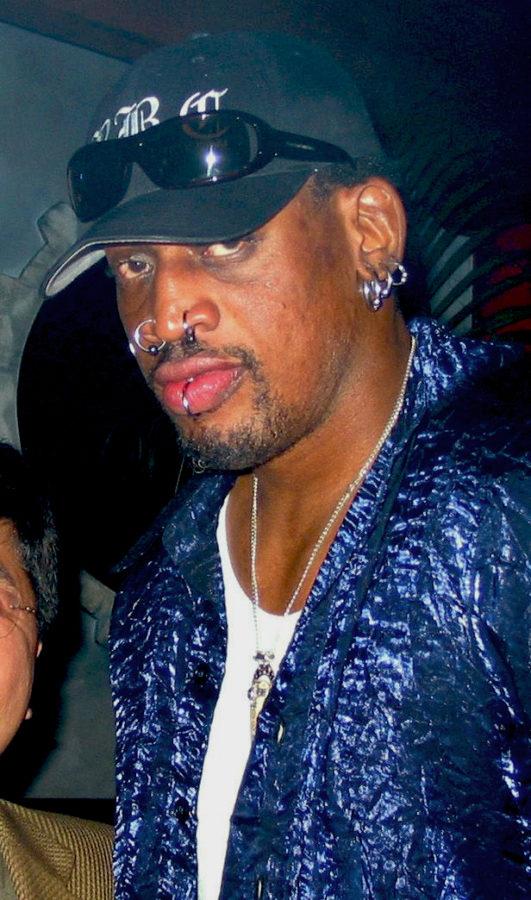Brown: Dennis Rodman befriends the enemy
Dennis Rodman’s relationship with North Korea’s Kim Jong-un is not the way for the former athlete to approach diplomacy, according to Columnist Brown.
January 13, 2014
Dennis Rodman has made plenty of headlines in his career as a public figure.
The Hall of Famer and five-time NBA champion was known around the world for his bad boy persona and wacky, if usually harmless, antics during his playing years. Recently, Rodman has come back into the spotlight because of his relationship with North Korean dictator Kim Jong-un and his trips to the oppressed nation.
Despite wide-ranging public outrage at his association with one of the most oppressive leaders in today’s world, Rodman has continued to defend both Kim Jong-un, at least in a personal capacity, and North Korea generally. His association with the Asian country should not only be embarrassing to Rodman, but it should outrage the rest of us living in the democratic world.
At their heart, the actions of Dennis Rodman seem commendable. Here is a man apparently trying to use his fame and specific skillset to bridge the culture gap between North Korea and much of the rest of the world. What he fails to realize is that he is not the person to perform such an outreach, and his methods have thus far been supremely flawed.
While it is certainly true that much good can come from the interaction of different peoples directly, as opposed to the interaction of governments, just who represents a culture can be extremely important. It is imperative that such representatives not only carry some form of weight with the people they will be visiting, but with the culture or people they come from as well.
Dennis Rodman is by no means a respected figure in our society. His skills on the basketball court are of course legendary, and his value as an entertainer has been recognized in other areas as well, but he is not a serious man. To find this, one needs to look no further than his appearance.
Obviously, no one should simply judge a man or woman by how he or she looks, but in the case of Dennis Rodman, we see a man who has deliberately and systematically made himself appear as an outcast. He has actively tried over the span of years to stand out and be as outrageous as possible.
Such a distinction is perfectly okay, but it comes with certain consequences. One of the consequences that comes with forcibly removing yourself from the norms of society is that you can no longer become a social leader, at least not without reentering the society you previously left behind.
In terms of public leadership, this means more than simply laying low for a few years or becoming involved with a local community. For a man like Dennis Rodman to become a representative of our culture and society, he would have to first publicly and obviously renounce his status as merely a rebel for rebellion’s sake.
It may be that his political activism is an attempt at just that, but instead of cementing his place in our culture as an accepted public persona first, he has grasped at legitimacy by diving headfirst into one of the most tense political relationships in the world.
Perhaps because his experience lies in other areas, Rodman has also taken up a horrendous strategy for spreading his message of acceptance and international goodwill.
A common refrain appears to be that his work is not about political issues. In an interview with ABC, Rodman said “I’m not like a diplomat, I don’t want to do that.” A fellow basketball player, Charles Smith, along with other former NBA players, sat with Rodman during a satellite interview with CNN’s Chris Cuomo. Smith, unlike Rodman, kept his cool and asserted that “…we’re not here for any political aspects. We’re not here to talk politics.”
Unfortunately for Smith, Rodman, and the other players seeking to engage in “basketball diplomacy”, they are involved in politics. They became involved the moment their relationship was with Kim Jong-un and not the people of North Korea. By engaging the dictator in an overwhelmingly positive manner, they have given credibility, however slight, to the oppressive government centered in Pyongyang.
Rodman’s assurances that Kim Jong-un is “a good guy to me” and “a good dad” do little for the millions living under his brutal regime. They do little for Kenneth Bae, an American citizen held by North Korea on various charges including attempting to overthrow the government — Rodman apologized Thursday for earlier, vague remarks suggesting Bae may have deserved the charges.
Maybe more importantly, Rodman’s actions do nothing to show the government of North Korea that the rest of the world will not accept their actions. He may very well have the best of intentions, but Dennis Rodman has absolutely no business in the business of international diplomacy.







